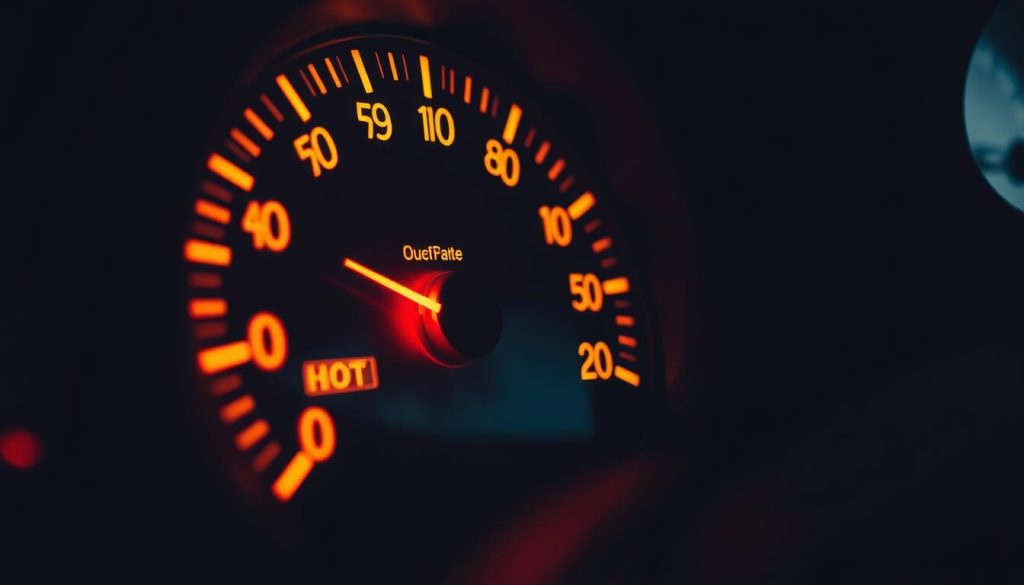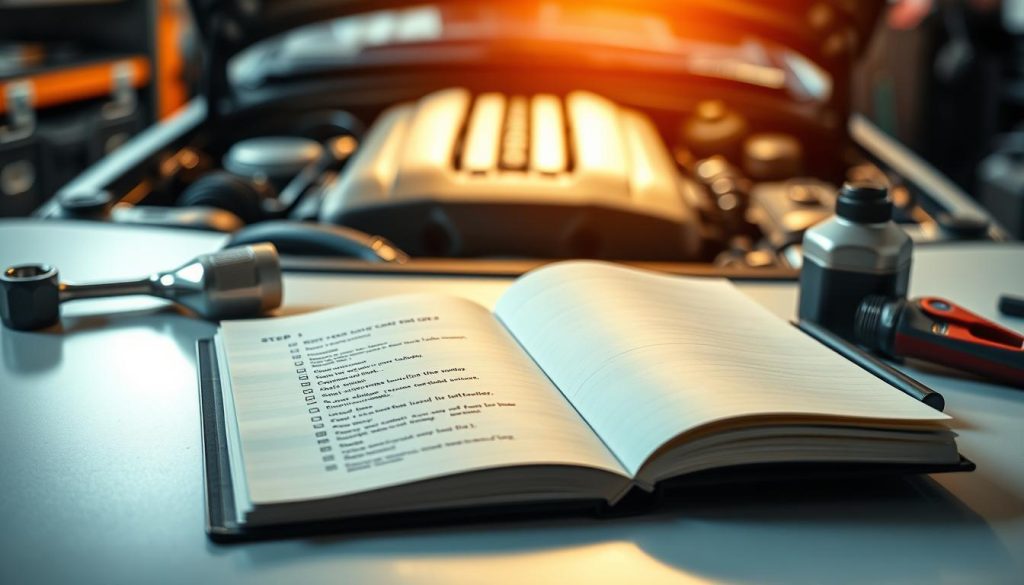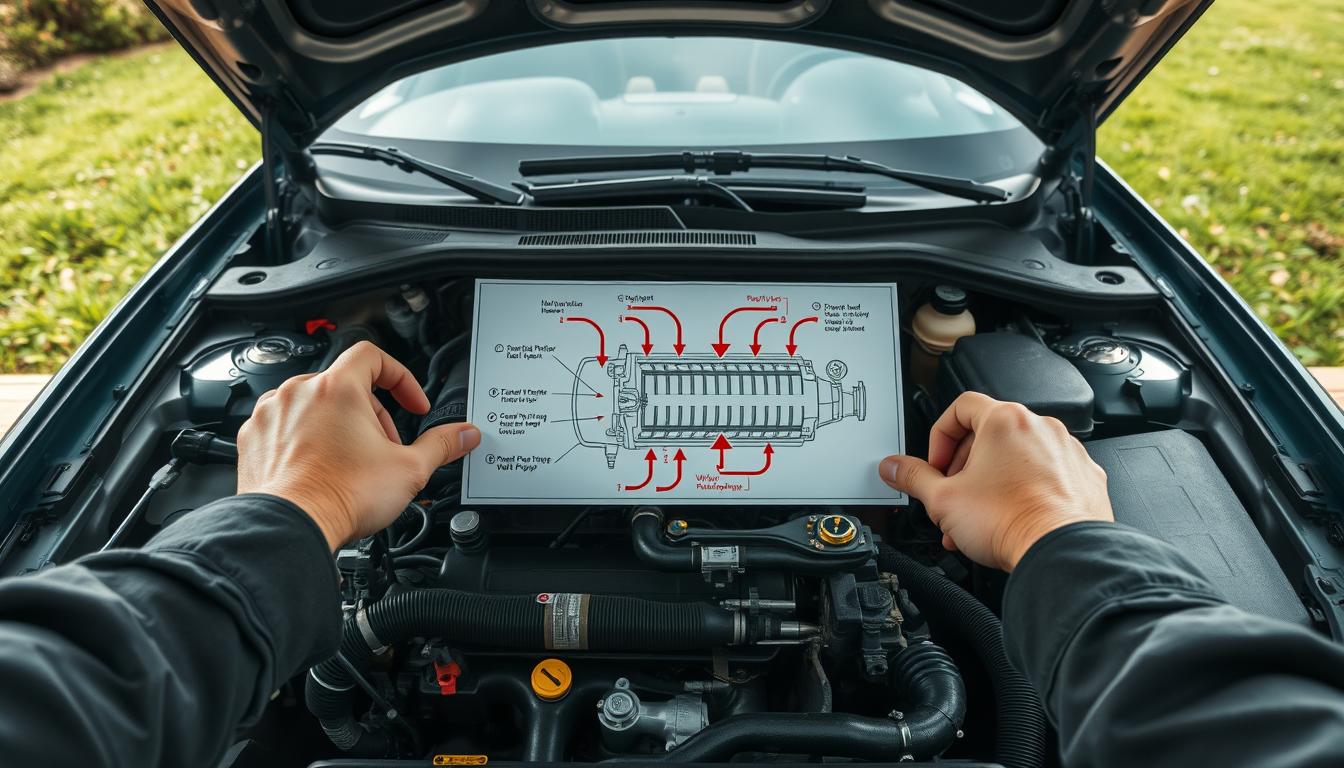At Heaven Automotive, we know how alarming it can feel when your car’s temperature gauge spikes unexpectedly. Whether you’re stuck in traffic or miles from the nearest mechanic, a rising engine temperature demands quick action to avoid long-term damage. Our team has helped countless drivers tackle this problem, and we’re here to share practical solutions that keep you safe and your vehicle running smoothly.
Understanding why your vehicle struggles with heat is the first step toward preventing breakdowns. Most cases stem from cooling system failures, low coolant levels, or worn-out components. Ignoring warning signs like steam under the hood or a flashing dashboard light can lead to costly repairs—or even leave you stranded.
We’ll walk you through identifying early symptoms, such as unusual smells or fluctuating gauges, so you can act before minor issues escalate. You’ll also learn how to safely cool an overheated car and when to call a professional. Our goal? To help you protect your investment and drive with confidence.
Key Takeaways
- Recognize early signs like steam, dashboard warnings, or coolant leaks to prevent major damage.
- Pull over safely and turn off the car immediately if temperatures rise dangerously.
- Regular maintenance of radiators, hoses, and coolant levels reduces overheating risks.
- Never open a hot radiator cap—this can cause severe burns or coolant explosions.
- Address minor cooling system issues promptly to avoid expensive engine repairs.
Introduction to Engine Overheating
A sudden spike in your car’s temperature gauge often catches drivers off guard. At Heaven Automotive, we see this as a critical moment where knowledge and preparation make all the difference. Every vehicle relies on a delicate balance between power generation and heat management to function safely.
Our Approach to Automotive Care
We focus on preventive strategies rather than reactive fixes. Modern cars work like athletes—they perform best when their cooling systems operate at peak efficiency. Through regular check-ups and owner education, we help drivers spot minor issues before they escalate.
Our team emphasizes simple habits like seasonal coolant flushes and hose inspections. These steps maintain stable temperatures while boosting fuel economy. Remember, a well-maintained car doesn’t just run cooler—it lasts longer.
Why Maintaining a Cool Engine Matters
Excessive heat strains every part of your vehicle, from the radiator to the transmission. Proper temperature control prevents wear on seals, gaskets, and electrical components. We’ve found that drivers who prioritize cooling system care save an average of $1,200 annually on repairs.
Think of your car’s cooling system as its immune system. When it’s strong, small problems stay small. Letting it weaken risks costly breakdowns and reduced performance. We’re here to help you build that resilience through smart maintenance choices.
Recognizing the Signs of Engine Overheating
Many drivers miss the early clues that their vehicle needs urgent attention. At Heaven Automotive, we train drivers to spot subtle changes in their car’s behavior—changes that often appear long before major breakdowns occur.

Temperature Gauge Alerts and Warning Lights
Your dashboard’s temperature gauge is like a silent messenger. When it creeps into the red zone or shows an “H” reading, your car is shouting for help. We’ve seen countless cases where drivers ignore these signals, only to face costly repairs later.
Modern vehicles often pair gauge spikes with flashing warning lights. These aren’t suggestions—they’re demands for immediate action. Our team recommends pulling over safely the moment you see these alerts.
Steam, Unusual Smells, and Loss of Engine Power
White vapor billowing from under the hood usually means coolant is boiling over. Unlike normal exhaust steam, this thick cloud signals a critical cooling system failure. We’ve noticed sweet syrup-like odors often accompany this steam—a telltale sign of leaking coolant.
Burning rubber smells? That could mean slipping belts or melting hoses. If your car suddenly feels sluggish or stalls, it’s likely activating safety protocols to prevent damage. At Heaven Automotive, we treat these symptoms as urgent red flags requiring professional diagnosis.
Immediate Steps to Take When Your Car Overheats
When your dashboard lights up with a temperature warning, quick thinking becomes your best defense. At Heaven Automotive, we’ve developed proven protocols to help drivers stabilize their vehicle before permanent damage occurs. Follow these steps carefully to protect your safety and your car’s vital components.
Reduce Strain and Redirect Heat
First, switch off your air conditioning. This instantly lightens the load on your struggling motor. Next, turn your heater to full blast. While uncomfortable, this clever trick pulls excess warmth from the cooling system into the cabin. We’ve seen this simple shift lower critical temperatures by 15-20°F in emergencies.
Safe Parking and Cooling Protocol
Find a flat, shaded area to stop immediately. Idling in traffic keeps generating heat – pull onto the shoulder if necessary. Kill the ignition once parked. Our team insists on waiting 30+ minutes before touching the hood. Hot coolant can erupt like a geyser, causing severe burns.
Once cooled, check the reservoir (never the radiator cap first). If low, add a 50/50 coolant mix. Restart cautiously and watch the gauge like a hawk. If it spikes again, call for help. Remember – pushing a failing vehicle often turns minor fixes into four-figure repairs.
Understanding Engine Overheating Issues
Your car stays cool through a carefully coordinated team effort. At Heaven Automotive, we break down this process into simple terms so you can spot potential weak points before they cause trouble.
Cooling System Functions and Key Components
The cooling system works like your car’s personal climate manager. It contains four main players working in harmony:
- Radiator: Acts as a heat dumpster, using airflow to cool hot liquid
- Water pump: Keeps coolant moving like a bloodstream through the motor
- Thermostat: Smart valve that opens when temperatures rise
- Hoses: Durable pathways ensuring leak-free circulation
The Science Behind Temperature Regulation
Coolant mixture matters more than most drivers realize. We always explain it’s not just water—it’s a 50/50 blend of antifreeze and distilled water. This combo:
- Boils at 265°F instead of 212°F (pure water)
- Prevents rust in metal parts
- Lubricates the water pump
Our team checks coolant levels during every oil change. Low fluid means less heat absorption—like trying to cool a house with half the AC vents closed. Pair this with thermostat testing, and you’ve got a recipe for year-round temperature control.
Common Causes Behind Engine Overheating
Understanding why your car runs hot starts with knowing the usual suspects. At Heaven Automotive, we’ve identified patterns that account for 80% of temperature-related breakdowns. Let’s break down what typically goes wrong—and how to spot trouble early.
Low Coolant Levels and Leaking Hoses
Coolant shortages top our repair logs. Tiny cracks in hoses or loose clamps let fluid escape slowly—sometimes just a few drops daily. We often find dried pink or green residue around connections during inspections, signaling hidden leaks.
Evaporation plays a role too. Old coolant loses its protective properties, boiling away faster in summer heat. Our team recommends checking the overflow tank monthly. If levels keep dropping, you’ve likely got a silent saboteur in your cooling system.
Faulty Water Pump, Bad Radiator, and Thermostat Failure
A broken water pump is like a stalled heart. When its impeller wears out, coolant stops circulating. Listen for whining sounds near the front of your car—a classic warning sign we hear during test drives.
Radiator issues often start externally. Bent fins from road debris block airflow, while internal rust clogs narrow coolant channels. As for thermostats? We’ve replaced dozens stuck in the closed position this year alone. They trap hot fluid instead of releasing it to the radiator.
Remember—these components work as a team. One weak link strains the whole system. Regular checks help catch problems before your dashboard lights up like a warning sign convention.
Prevention Strategies for a Cooler Engine
Smart drivers know prevention beats repairs every time. At Heaven Automotive, we focus on simple habits that keep your car running cooler and longer. Regular fluid checks and component inspections form the foundation of reliable performance.

Regular Coolant Checks and System Flushing
Your coolant is the lifeblood of temperature control. We teach customers to:
- Verify coolant levels monthly when the motor is cool
- Use a 50/50 antifreeze-water mix for optimal heat transfer
- Schedule professional flushes every 30,000 miles
Contaminated fluid loses its protective properties. Our team uses specialized equipment to remove sludge and corrosion during flushes.
Proper Radiator and Belt Maintenance
A clean radiator works 40% more efficiently. During routine maintenance, we:
- Straighten bent fins blocking airflow
- Pressure-test hoses for hidden leaks
- Check belts for fraying or unusual wear
Worn components strain the entire cooling system. Catching small issues early helps avoid sudden failures during summer drives or heavy traffic.
We’ve seen proper care extend vehicle lifespans by 3-5 years. Let’s build a prevention plan tailored to your car’s needs—before temperatures rise.
Maintenance Tips for Your Car’s Cooling System
Your vehicle’s cooling system thrives on regular attention and smart habits. At Heaven Automotive, we help drivers build routines that catch small problems early. Simple checks and timely professional support keep your cooling system efficient year-round.
Routine Inspections and Temperature Tracking
We guide customers to check coolant levels monthly and inspect hoses for cracks. A clean radiator improves airflow—wipe debris off fins gently. Watch your temperature gauge during uphill drives or towing. Consistent mid-range readings mean your system works properly.
Smart Diagnostics Save Money
If your gauge fluctuates oddly or coolant disappears weekly, visit us. Our scanners detect hidden leaks and thermostat glitches. Seasonal check-ups before extreme temperatures hit prevent 90% of common failures. Remember—delaying repairs often triples costs later.
We’re here to help your car stay cool under pressure. Schedule a maintenance review today and drive with peace of mind tomorrow.

